Effectiveness of Mindfulness Based Therapy in Reducing Depression and Suicide Ideation in Military Veterans
26 Pages6308 Words86 Views
Added on 2023-02-01
About This Document
This proposal aims to evaluate the impact of psychological intervention on reducing depressive symptoms and preventing suicide ideation in military veterans. The research question focuses on the effectiveness of psychological intervention in reducing symptoms of depression and post-traumatic stress disorder (PTSD) among military veterans within one year. The proposed solution is to implement mindfulness-based cognitive therapy (MBCT) as a psychological intervention to treat depression and suicide ideation in military veterans.
Effectiveness of Mindfulness Based Therapy in Reducing Depression and Suicide Ideation in Military Veterans
Added on 2023-02-01
ShareRelated Documents
Running head: EVIDENVE BASED NURSING RESEARCH
Evidence based nursing research
Name of the student:
Name of the University:
Author’s note
Evidence based nursing research
Name of the student:
Name of the University:
Author’s note
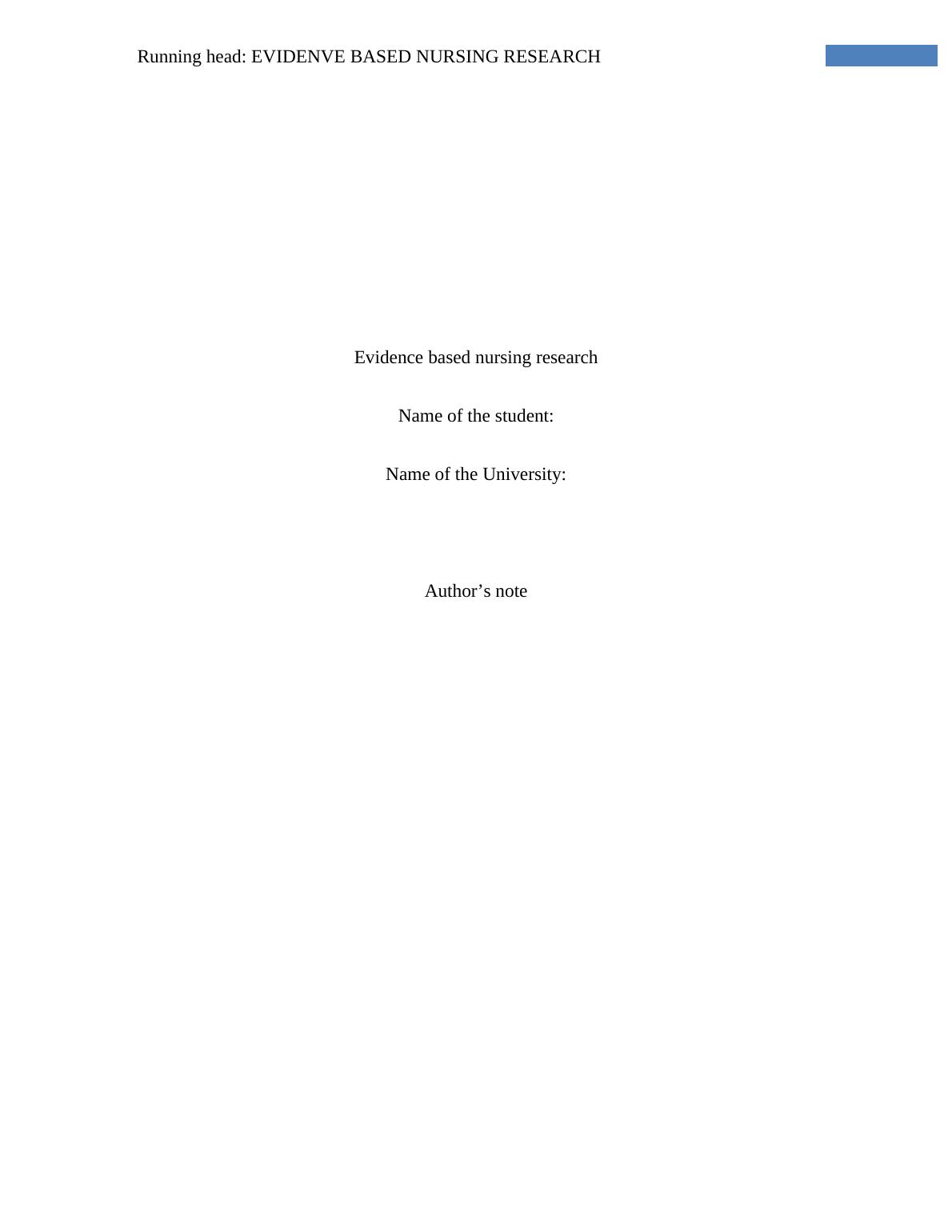
1EVIDENCE BASED NURSING RESEARCH
Title: Effectiveness of mindfulness based therapy in reducing depression and suicide ideation in
military veterans
Introduction:
Mental disorders are the range of mental health conditions that has an impact on mood,
thinking and behaviour of a person leading to significant period of distress and impairment of
personal functioning. The example of mental disorders includes depression, schizophrenia, post-
traumatic stress disorder (PTSD), addictive behaviours and eating disorder. Due to the impact on
mental health on daily life activities and quality of life, identifying the population group who is
most vulnerable to mental disorder and analysing most effect psychological interventions to treat
them is important (Verma et al., 2017). The military veterans are one population group who is at
high risk of developing mental disorders compared to other population group. The term ‘military
veterans’ refer to those persons, who have served in the army for long time and is longer in
service. In Australia, those who were deployed to serve in the war-like-conflict environment in
the Australian Defence Force (ADF) are referred as veterans. The statistics by Australian
Institute of Health and Welfare (2018) reports that veterans aged between 55-64 years who have
served in the ADF suffer from greater mental health and behavioural problems compared to other
population group. The suicide rate of ex-service men is about 1.2 times higher than rest of
Australian population. Considering these alarming statistics, identifying cause behind risk of
mental illness in the group and the effectiveness of psychological intervention in reducing mental
health burden is important.
The burden of mental illness among military veterans has been extensively covered in
research literature. For example, Boakye et al. (2017) revealed that veterans returning from war
Title: Effectiveness of mindfulness based therapy in reducing depression and suicide ideation in
military veterans
Introduction:
Mental disorders are the range of mental health conditions that has an impact on mood,
thinking and behaviour of a person leading to significant period of distress and impairment of
personal functioning. The example of mental disorders includes depression, schizophrenia, post-
traumatic stress disorder (PTSD), addictive behaviours and eating disorder. Due to the impact on
mental health on daily life activities and quality of life, identifying the population group who is
most vulnerable to mental disorder and analysing most effect psychological interventions to treat
them is important (Verma et al., 2017). The military veterans are one population group who is at
high risk of developing mental disorders compared to other population group. The term ‘military
veterans’ refer to those persons, who have served in the army for long time and is longer in
service. In Australia, those who were deployed to serve in the war-like-conflict environment in
the Australian Defence Force (ADF) are referred as veterans. The statistics by Australian
Institute of Health and Welfare (2018) reports that veterans aged between 55-64 years who have
served in the ADF suffer from greater mental health and behavioural problems compared to other
population group. The suicide rate of ex-service men is about 1.2 times higher than rest of
Australian population. Considering these alarming statistics, identifying cause behind risk of
mental illness in the group and the effectiveness of psychological intervention in reducing mental
health burden is important.
The burden of mental illness among military veterans has been extensively covered in
research literature. For example, Boakye et al. (2017) revealed that veterans returning from war
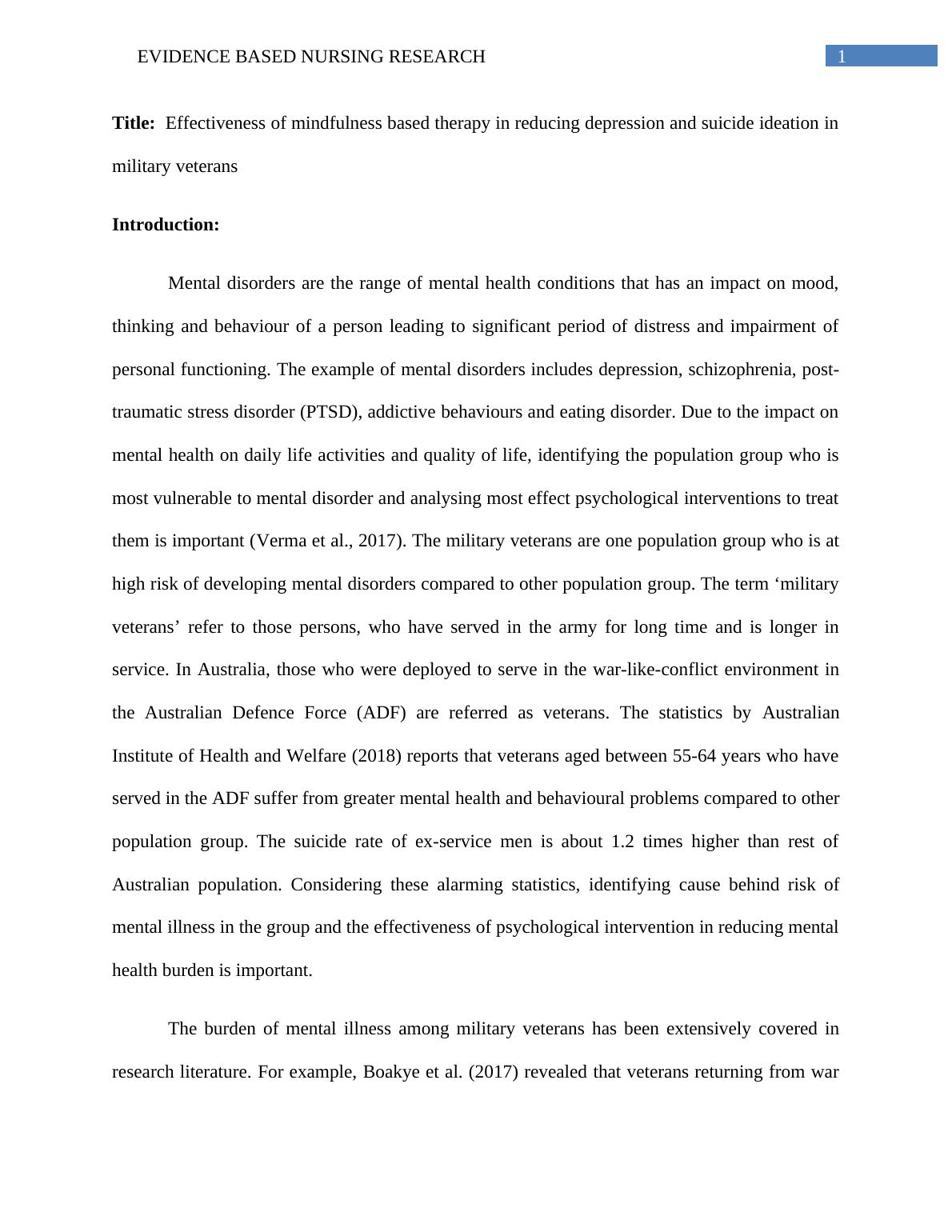
2EVIDENCE BASED NURSING RESEARCH
suffer from mental problem and the prevalence of life time depression in this group is about14 to
34%. They also suffer from emotional problems, suicide ideation and attempts and risk of other
chronic disease. Hence, understanding the burden of depressive disorder among military veterans
and the effective psychological interventions to promote recovery of such individual is critical.
The main purpose of this proposal is to evaluate the impact of psychological intervention
on reducing depressive symptom and preventive suicide ideation in military veterans. The
problem will give an insight into the background information and research problem related to the
topic, details on past research done on the topic and proposed solution to be implemented in
targeting setting. The proposal will give a detailed description of the intervention, the methods to
be taken to implement the intervention in target setting and the evaluation of the outcome of the
research project. The overall proposal will define how mindfulness based cognitive therapy can
treat PTSD and suicide ideation in military veterans.
Problem statement:
The main rationale for research on the topic of psychological intervention to treat
depressive disorder in military veterans is the prevalence of depression and PTSD in this
population group and the significance impact of this issue on the life of affected individuals.
Goldstein et al. (2017) gave evidence regarding the deleterious effect of traumatic military
experiences on female veterans. The study revealed sexual assault and sexual harassment as the
primary cause behind symptom of depression in female veterans. The investigation done in a
Veteran Health Administration medical centre revealed that 90% of women report about being
exposed to military trauma exposure. Because of this experience, they were also found to be
screened positive for depression and PTSD. Although this study particularly reported about
suffer from mental problem and the prevalence of life time depression in this group is about14 to
34%. They also suffer from emotional problems, suicide ideation and attempts and risk of other
chronic disease. Hence, understanding the burden of depressive disorder among military veterans
and the effective psychological interventions to promote recovery of such individual is critical.
The main purpose of this proposal is to evaluate the impact of psychological intervention
on reducing depressive symptom and preventive suicide ideation in military veterans. The
problem will give an insight into the background information and research problem related to the
topic, details on past research done on the topic and proposed solution to be implemented in
targeting setting. The proposal will give a detailed description of the intervention, the methods to
be taken to implement the intervention in target setting and the evaluation of the outcome of the
research project. The overall proposal will define how mindfulness based cognitive therapy can
treat PTSD and suicide ideation in military veterans.
Problem statement:
The main rationale for research on the topic of psychological intervention to treat
depressive disorder in military veterans is the prevalence of depression and PTSD in this
population group and the significance impact of this issue on the life of affected individuals.
Goldstein et al. (2017) gave evidence regarding the deleterious effect of traumatic military
experiences on female veterans. The study revealed sexual assault and sexual harassment as the
primary cause behind symptom of depression in female veterans. The investigation done in a
Veteran Health Administration medical centre revealed that 90% of women report about being
exposed to military trauma exposure. Because of this experience, they were also found to be
screened positive for depression and PTSD. Although this study particularly reported about
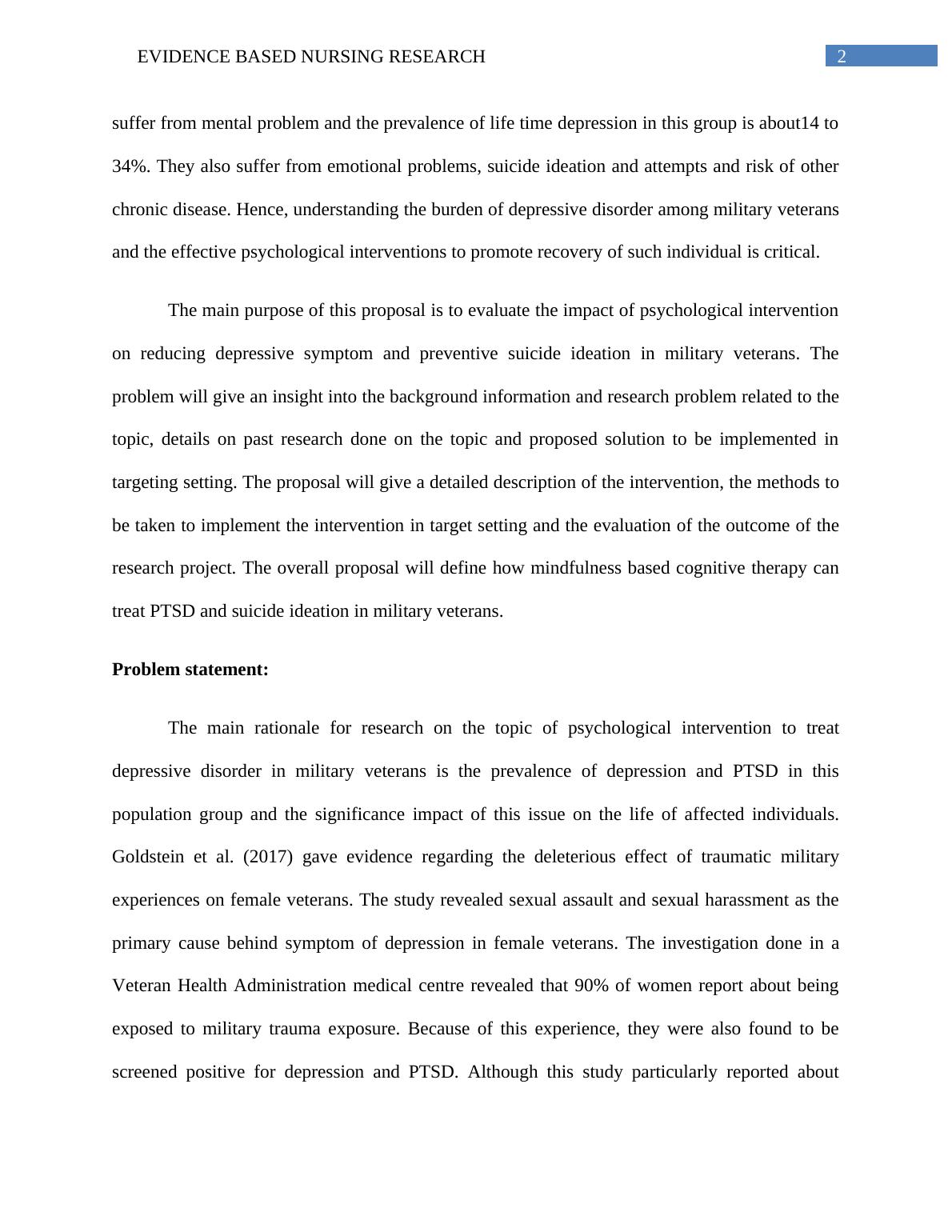
3EVIDENCE BASED NURSING RESEARCH
trauma experiences for females, the study by Reed, Masters and Roeger (2016) revealed about
the factors contributing to mental disorder in for all military veterans including both male and
female. The study reported that as military veterans are exposed to stressful experience and
traumatic events, this has a significant impact on their mental health. The nature of their job is
associated with increased exposure to life-threatening event. Therefore, having an understanding
regarding how these exposures interact to affect well-being of veterans is critical to provide them
mental health support.
There are many risk factors that increase prevalence of mental illness like PTSD in
military veterans. The key risk factors before exposure to the trauma includes low level of
education, female gender, ethnic minority status, combat specialization, long duration of
deployment, non-officer ranges, adverse life events and prior trauma exposure. In addition, the
risk factors that dominate during the service period includes combat exposure, witnessing
wounded person or person being killed, severe trauma, discharging a weapon and stressors in the
job. Another significant risk factor that has been identified is the lack of post-deployment
support for veterans (Xue et al., 2015). This information justifies the rationale for the topic and
importance of identifying psychological interventions that protect military veterans against the
susceptibility to PTSD. The research outcomes will have significant implications for military
leaders and policy makers so that they implement proper programs to increase assessment,
prevention efforts and interventions for mental disorders like PTSD and depression in military
veterans.
Another critical adverse effect of continued period of depression and no treatment
in military veterans is that it increases risk of suicide ideation among them. Bryan et al. (2015)
revealed that depression, post traumatic stress and guilt is a risk factor that determine suicide
trauma experiences for females, the study by Reed, Masters and Roeger (2016) revealed about
the factors contributing to mental disorder in for all military veterans including both male and
female. The study reported that as military veterans are exposed to stressful experience and
traumatic events, this has a significant impact on their mental health. The nature of their job is
associated with increased exposure to life-threatening event. Therefore, having an understanding
regarding how these exposures interact to affect well-being of veterans is critical to provide them
mental health support.
There are many risk factors that increase prevalence of mental illness like PTSD in
military veterans. The key risk factors before exposure to the trauma includes low level of
education, female gender, ethnic minority status, combat specialization, long duration of
deployment, non-officer ranges, adverse life events and prior trauma exposure. In addition, the
risk factors that dominate during the service period includes combat exposure, witnessing
wounded person or person being killed, severe trauma, discharging a weapon and stressors in the
job. Another significant risk factor that has been identified is the lack of post-deployment
support for veterans (Xue et al., 2015). This information justifies the rationale for the topic and
importance of identifying psychological interventions that protect military veterans against the
susceptibility to PTSD. The research outcomes will have significant implications for military
leaders and policy makers so that they implement proper programs to increase assessment,
prevention efforts and interventions for mental disorders like PTSD and depression in military
veterans.
Another critical adverse effect of continued period of depression and no treatment
in military veterans is that it increases risk of suicide ideation among them. Bryan et al. (2015)
revealed that depression, post traumatic stress and guilt is a risk factor that determine suicide
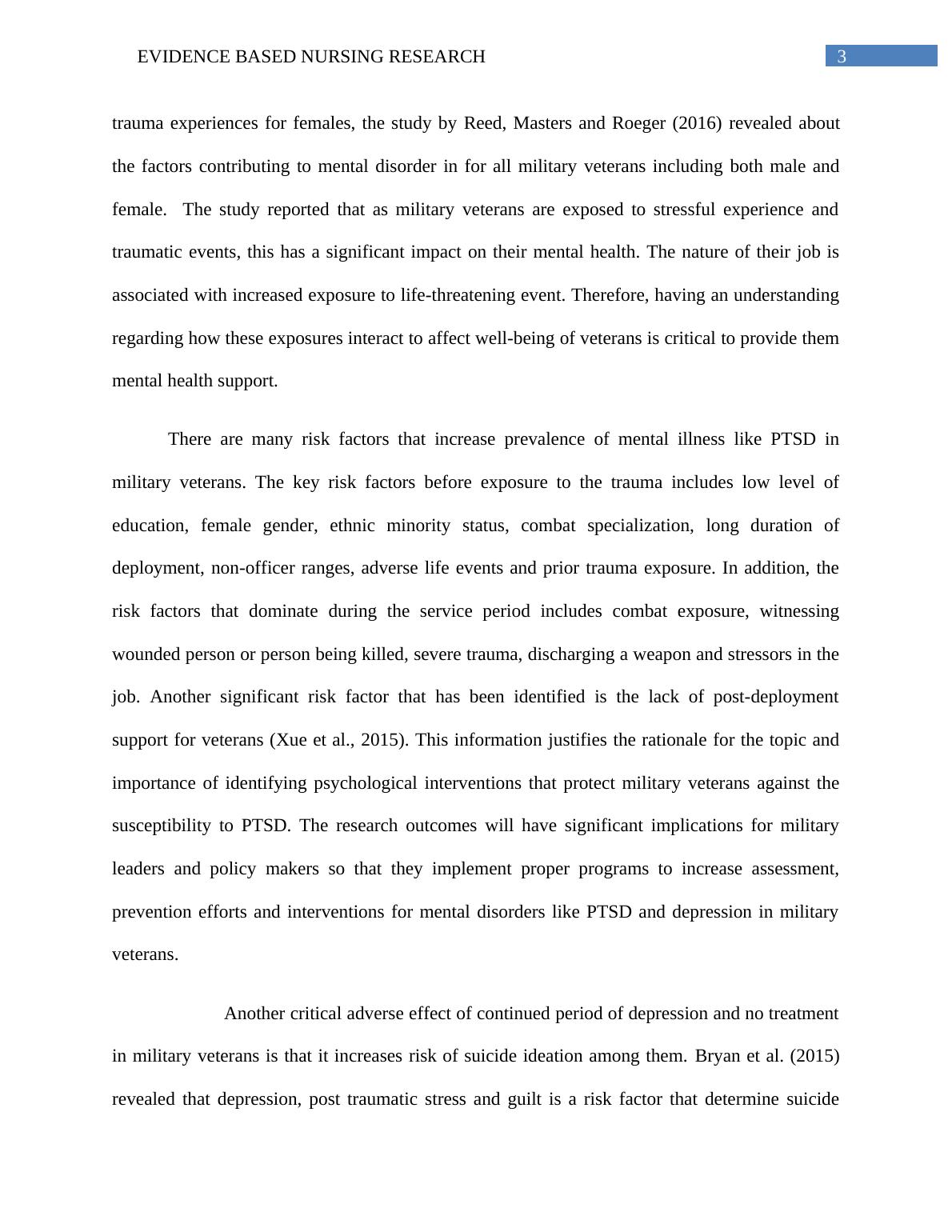
4EVIDENCE BASED NURSING RESEARCH
ideation in the target sample group. By exploring the relation depression and suicide and ideation
in sample of military veterans, the study revealed that depression and PTSD further increase risk
for suicide and suicide attempts in army personnel. The feeling of guilt was also a major factor
that predicted suicide ideation. Moral injury contributes to suicidal behaviour and self-
forgiveness and changing guilt feeling is critical to decrease risk for suicide attempts. Hence, this
finding also suggest the need to implement and evaluate the impact of psychological
interventions like cognitive behavioural therapy and trauma focused therapy as they can address
negative thought patterns in individual. By the review of research literature, the proposal aims to
identify the psycholohical intervention that can address both depression and suicide ideation in
military veterans.
The above discussion defines the research problem and the key research focus based on
risk factors and research problem identified. The prevalence of depression and the risk factors
justifies why focusing on mental health needs of military veterans are critical for their overall
health and well-being. The research proposal will be guided by a research question. Based on the
above discussion of the prevalence of mental disorders like depression and post traumatic stress
disorder, the following PICOT question will help to understand the impact of psychological
interventions on reducing the symptom of depression:
P: Military veterans
I: Psychological intervention
C: no treatment
O: reduction of symptoms of depression and post traumatic stress disorder (PTSD)
ideation in the target sample group. By exploring the relation depression and suicide and ideation
in sample of military veterans, the study revealed that depression and PTSD further increase risk
for suicide and suicide attempts in army personnel. The feeling of guilt was also a major factor
that predicted suicide ideation. Moral injury contributes to suicidal behaviour and self-
forgiveness and changing guilt feeling is critical to decrease risk for suicide attempts. Hence, this
finding also suggest the need to implement and evaluate the impact of psychological
interventions like cognitive behavioural therapy and trauma focused therapy as they can address
negative thought patterns in individual. By the review of research literature, the proposal aims to
identify the psycholohical intervention that can address both depression and suicide ideation in
military veterans.
The above discussion defines the research problem and the key research focus based on
risk factors and research problem identified. The prevalence of depression and the risk factors
justifies why focusing on mental health needs of military veterans are critical for their overall
health and well-being. The research proposal will be guided by a research question. Based on the
above discussion of the prevalence of mental disorders like depression and post traumatic stress
disorder, the following PICOT question will help to understand the impact of psychological
interventions on reducing the symptom of depression:
P: Military veterans
I: Psychological intervention
C: no treatment
O: reduction of symptoms of depression and post traumatic stress disorder (PTSD)
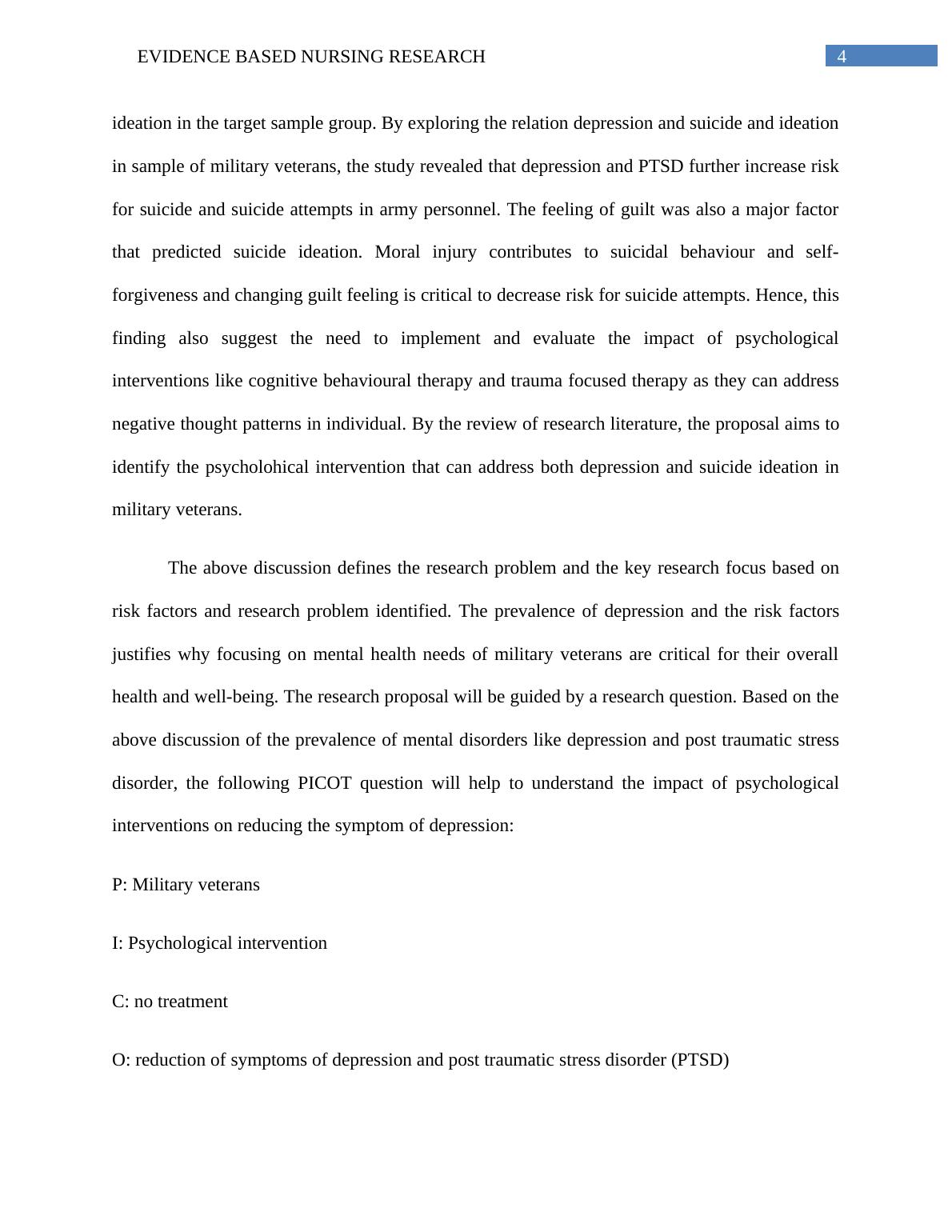
5EVIDENCE BASED NURSING RESEARCH
T: one year
The PICOT based research question for the proposal is:
Can psychological intervention help in the reduction of symptoms of depression and post
traumatic stress disorder among military veterans within one year?
Literature review:
The main purpose of literature review is to identify available psychological interventions
that have been implemented for addressing depression and suicide ideation in military veterans.
The significance of literature review in this proposal is that it identifies the most effective
psychological intervention to treat depression particularly in military depression and also
analyses gap in method of implementation of these interventions. This process has helped to
identify the solution for addressing the research problem and identifying the methods by which
proposed intervention can be implemented to treat depression in target population of military
veterans.
The review of research studies on potential psychological interventions to treat PTSD
among military veterans revealed mindfulness based cognitive therapy as one dominant
intervention that can address mental problems in the sample group. Firstly, a scoping review of
psychological interventions for PTSD in military personnel and veterans revealed cognitive
behavioural approach as a major treatment for the target population group. By review of
international academic literature on psychotherapeutic treatment for PTSD in veterans, the study
indicates that cognitive therapy has received majority of attention in research papers. At least
62% papers assessed the effectiveness of cognitive therapy, whereas only 3% papers assessed
relaxation therapies and art therapies (Rose, Aiken & McColl, 2014).Another review of
T: one year
The PICOT based research question for the proposal is:
Can psychological intervention help in the reduction of symptoms of depression and post
traumatic stress disorder among military veterans within one year?
Literature review:
The main purpose of literature review is to identify available psychological interventions
that have been implemented for addressing depression and suicide ideation in military veterans.
The significance of literature review in this proposal is that it identifies the most effective
psychological intervention to treat depression particularly in military depression and also
analyses gap in method of implementation of these interventions. This process has helped to
identify the solution for addressing the research problem and identifying the methods by which
proposed intervention can be implemented to treat depression in target population of military
veterans.
The review of research studies on potential psychological interventions to treat PTSD
among military veterans revealed mindfulness based cognitive therapy as one dominant
intervention that can address mental problems in the sample group. Firstly, a scoping review of
psychological interventions for PTSD in military personnel and veterans revealed cognitive
behavioural approach as a major treatment for the target population group. By review of
international academic literature on psychotherapeutic treatment for PTSD in veterans, the study
indicates that cognitive therapy has received majority of attention in research papers. At least
62% papers assessed the effectiveness of cognitive therapy, whereas only 3% papers assessed
relaxation therapies and art therapies (Rose, Aiken & McColl, 2014).Another review of
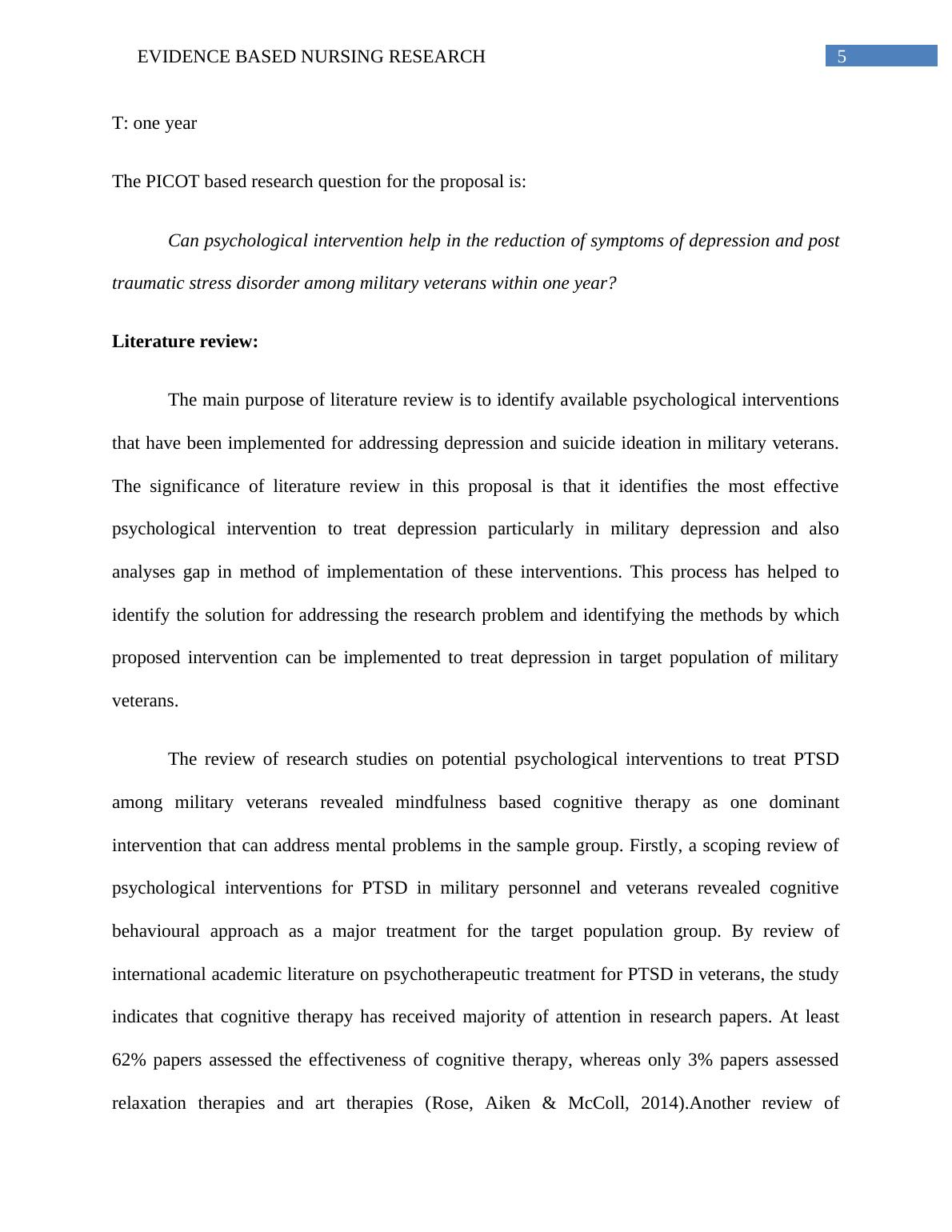
End of preview
Want to access all the pages? Upload your documents or become a member.
Related Documents
Psychological Intervention for Depression and PTSD among Military Veteranslg...
|5
|1119
|220
Evidence Based Nursinglg...
|6
|1211
|229
Evidence Based Nursing Researchlg...
|6
|1005
|281
EVIDENCE BASED NURSING.lg...
|3
|329
|75
Evidence Based Nursinglg...
|4
|642
|292
937872. 1. 937872 Name Institution Course Instructor Dalg...
|3
|438
|415
